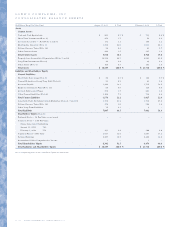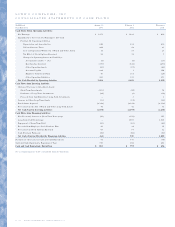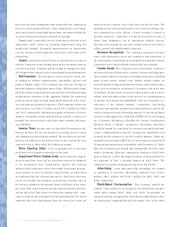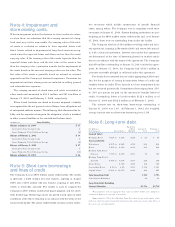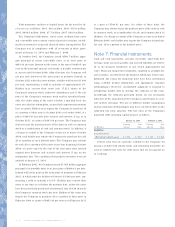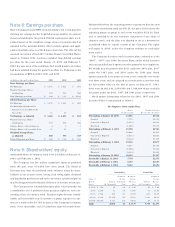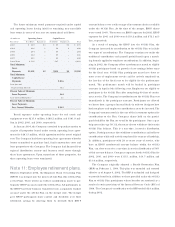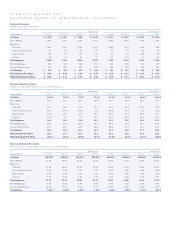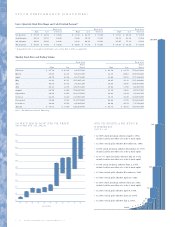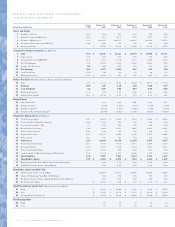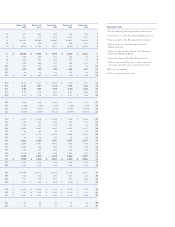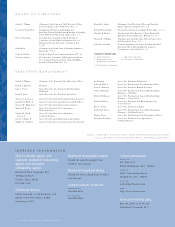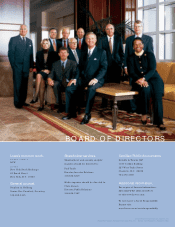Lowe's 2002 Annual Report Download - page 38
Download and view the complete annual report
Please find page 38 of the 2002 Lowe's annual report below. You can navigate through the pages in the report by either clicking on the pages listed below, or by using the keyword search tool below to find specific information within the annual report.
36 / 37 LO WE’S CO MPANIES, INC. ANNUAL REPORT 2002
Restricted stock awards of 20,000, and 1,741,400 shares,
with per share weighted-average fair values of $17.57, and
$12.40, were granted to certain executives in 1998 and 1997,
respectively. No restricted stock awards were granted in 2002,
2001 and 2000. At January 31, 2003, all restricted stock awards
were fully vested. Related expenses (charged to compensation
expense) for 2002, 2001 and 2000 were none, $1.9 million and
$7.3 million, respectively.
In 1999, the Company’s shareholders approved the Lowe’s
Companies, Inc. Directors’ Stock Option Plan, which replaced the
Directors’ Stock Incentive Plan that expired on May 29, 1998.
During the term of the Plan, each non-employee Director will be
awarded 4,000 options on the date of the first board meeting after
each annual meeting of the Company’s shareholders (the award
date). The maximum number of shares available for grant under
the Plan is 500,000, subject to adjustment. No awards may be
granted under the Plan after the award date in 2008. The options
vest evenly over three years, expire after seven years and are
assigned a price equal to the fair market value of the Company’s
common stock on the date of grant.
Stock option information related to the Directors’ Stock Option
Plan is summarized as follows:
Directors’ Stock Option Plans
Shares Weighted-Average
(In Thousands) Exercise Price Per Share
Outstanding at January 28, 2000 36 $25.85
Granted 32 $22.88
Canceled or Expired (8) $25.85
Outstanding at February 2, 2001 60 $24.27
Granted 40 $35.91
Outstanding at February 1, 2002 100 $28.92
Granted 40 $47.16
Exercised (4) $25.85
Outstanding at January 31, 2003 136 $34.38
Exercisable at January 31, 2003 59 $27.06
Exercisable at February 1, 2002 29 $24.77
Exercisable at February 2, 2001 9 $25.85
During 2000, the Company established a qualified Employee
Stock Purchase Plan that allows eligible employees to participate in
the purchase of designated shares of the Company’s common
stock. Ten million shares were authorized for this plan with
6,095,249 remaining available at January 31, 2003. The purchase
price of this stock is equal to 85% of the lower of the closing price
at the beginning or the end of each semi-annual stock purchase
period. The Company issued 1,341,241, 1,688,966 and 874,448
shares of common stock pursuant to this plan during 2002, 2001
and 2000, respectively. No compensation expense has been
recorded in the accompanying consolidated statement of earnings
related to this Plan as the Plan qualifies as non-compensatory
under the intrinsic value method of accounting. Under the fair
value method of accounting, compensation expense will be recog-
nized in fiscal 2003.
The Company reports comprehensive income in its consolidat-
ed statements of shareholders’ equity. Comprehensive income rep-
resents changes in shareholders’ equity from non-owner sources.
For the three years ended January 31, 2003, unrealized holding
gains/losses on available-for-sale securities were the only items of
other comprehensive income for the Company. The unrealized net
loss on available-for-sale securities was $285 thousand, net of the
tax benefit of $172 thousand for 2002. Unrealized net gains on
available-for-sale securities were $239 thousand and $871 thou-
sand, net of tax expenses of $130 thousand and $443 thousand for
2001 and 2000, respectively. The reclassification adjustments for
gains/losses included in net earnings for 2002, 2001 and 2000
were immaterial.
Note 10: Leases.
The Company leases certain store facilities under agreements with
original terms generally of twenty years. Certain lease agreements
contain rent escalation clauses that are charged to rent expense on
a straight-line basis. Some agreements also provide for contingent
rental based on sales performance in excess of specified mini-
mums. In fiscal years 2002, 2001 and 2000, contingent rentals
have been nominal. The leases usually contain provisions for four
renewal options of five years each. Certain equipment is also leased
by the Company under agreements ranging from two to five years.
These agreements typically contain renewal options providing for
a re-negotiation of the lease, at the Company’s option, based on the
fair market value at that time.


